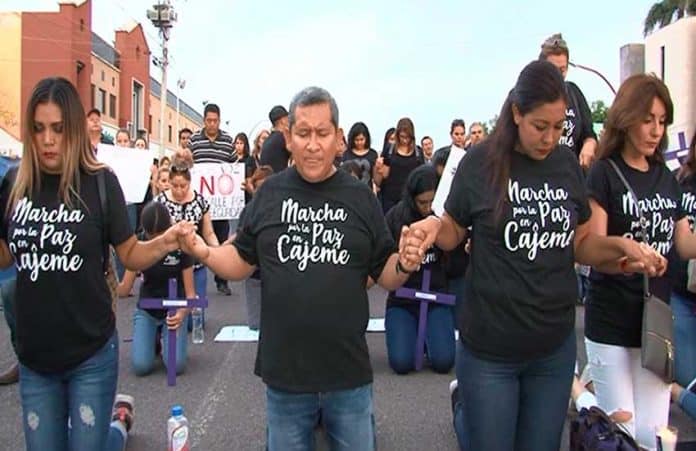There was an average of one murder a day last month at the hands of organized crime in Cajeme, Sonora, which has the distinction of being the only municipality in the state that is among the 50 most violent in the country.
As always, the violence is fueled by a turf war, in this case cells of the Sinaloa Cartel, the Jalisco New Generation Cartel (CJNG) and the criminal gang known as Los Salazar are believed to be behind the murders.
The escalating violence along with the death of a young man shot by state police served as triggers for a large protest at the end of last month in Ciudad Obregón.
Hundreds of citizens, including family members of victims of crime, took to the streets to demand peace and justice amid violence that bumped the municipality’s July homicides to the highest level in the past five years.
There were 32 homicide victims last month, including a man who had lined up to buy tortillas but was mistaken as a rival by a criminal gang and a well-known local lawyer who was gunned down at a shopping center in front of dozens of onlookers.
There have been 104 homicides to date this year in the southern Sonoran municipality; last year there were 198 and in 2016 there were 142.
The most prominent recent case, which sparked an even greater than usual outpouring of emotion and anger, is that of Alexis Rivera, an Uber driver who was killed by state police in Ciudad Obregón on July 22 while working to pay for his studies.
Police said Rivera was a “sicario,” or hit man, and that he had shot at them but members of his family reject the claim.
“. . . We know perfectly what he was like and the values that he had . . . he could never have been the sicario that they mention so many times in the police reports,” the deceased man’s sister, Joana Rivera, told the newspaper Milenio.
Rivera bled to death inside his car just blocks from the family home after calling his mother to ask for help.
Joana Rivera said that early reports from the Sonora Attorney General’s office indicated that Alexis had not fired at police as claimed, adding that there is video evidence that two state police officers had planted a gun with the victim to substantiate their version of events.
In an interview with Milenio, Cajeme Mayor Faustino Chávez didn’t comment on Rivera’s case but said the fight to control the local methamphetamine trade is largely responsible for the situation.
“Its origin is related to the high consumption of drugs, mainly cristal, a drug that has penetrated a lot in the community and as a result there is a criminal chain reaction that obviously culminates in these disputes . . . over the sale of this drug,” he said.
Chávez also said there has been a lack of coordination between municipal, state and federal authorities and security forces, explaining that “there has been coordination for very short periods but it hasn’t been permanent.”
Restaurant owner Raúl Ayala, who organized the peace march, described Cajeme as a “war zone” and said that the demands of the citizens who participated in the protest had been sent to Alfonso Durazo, a fellow Sonoran whom president-elect Andrés Manuel López Obrador has tapped to be public security secretary in the new government.
The demands weren’t submitted to any current authorities, Ayala explained, because none has taken any notice of their previous pleas.
Source: Milenio (sp)
